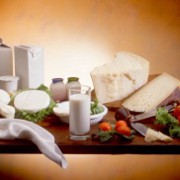More and more, we hear about keeping bones healthy and strong. Celebrities promote pharmaceuticals to prevent bone loss and increase density. What can you do NOW so that you can minimize the need for drug alternatives in later years? It is true that our bones lose strength and mass as we get older. Why wait for that bone density test when you’re 50 years old to confirm a problem? Keeping in mind that good nutrition and consistent exercise applies to all ages, here are some tips for keeping bones strong in your 20’s and 30’s.
Women in Your 20’s
This is when we turn 21, right? The social scene revolves around nightlife and the bars. Just don’t make it a habit. And, although you’re not concerned with hip fractures that your grandmother considers or the loss of bone density that's on your mother’s mind, this is the decade to start working on maintaining bone strength.
1. Avoid smoking. Smoking cigarettes hampers the work of bone-building cells and increases your risk of developing osteoporosis. Second hand smoke is nobody's friend either!
2. Exercise with Good Sense. Weight bearing exercise and activities, even simple activities like walking, is strongly recommended throughout your life. Exercise is great, but, Nathan Wei, MD, clinical director of the Arthritis and Osteoporosis Center of Maryland, recommends that obsessing about exercise to get that fashion model body is not good. He says women who engage in extreme exercise habits—to the point where they develop the loss of menstrual cycle—trick their bodies into thinking they are going into menopause, a major risk factor for osteoporosis.
3. Watch your weight. During your 20s, you may only be concerned with keeping a slim body, but a healthy body weight should be your goal. Being underweight is a high risk factor for osteoporosis. Find your body mass index (BMI) and if it is 18.5 kg/m2 or lower, you are underweight. Check yours at: www.WomansDay.com/BMI.
4. Take vitamin D. This vitamin is important at every age because it aids the body in the absorption of calcium. Because our lives keep us indoors most of the time, we don’t get the sun that we need. If you live in the North you need it even more than your friends in the South. Foods such as fatty fish (salmon) and milk as well as some juices contain vitamin D, but not in a large enough dose to get as much as the body needs, so, take 600 to 800 IU per day.
Women in Your 30’s
This is when many women are focused on career or starting a family. In addition to diet, exercise and Vitamin D, what else can you do to maintain strong bones?
1. Moderate salt and caffeine. Too much of either can promote calcium loss. Many dieticians recommend that women limit their sodium intake to 1,300 mg a day and caffeine to 200 to 300 mg a day to help reduce bone loss. Start reading labels. Life gets hectic! How much sodium is in that afternoon pick-me-up soda, the microwave Lean Cuisine for lunch or that Chinese carryout for dinner?
2. Limit drinking. Excessive alcohol consumption (more than two drinks a day) has been linked to increased risk of hip and other osteoporotic fractures. Two drinks every day, even wine or beer, is too much!
3. Consider a calcium supplement. Adult women should get about 1,000 mg of calcium a day. If you're pregnant or nursing, you should bump up your intake to 1,200 mg a day. Adding yogurt or low fat cheese to your diet will help increase your numbers.
4. Learn your family history. Ask about osteoporosis, fractures and other health issues that affect the women in your family. Is there anything that you need to know about your mother, grandmother, aunts or sisters that you can share with your doctor? Heredity plays a big part in assessing your risk. If there is an area of concern, you and your doctor can develop a diagnostic plan that may include a bone density exam prior to age 50.
Starting to think about bone health at an early age creates awareness that leads to the establishment of healthy habits. Maintain a good diet paying special attention to your need for supplemental Vitamin D and Calcium. Eat right and exercise not just for appearance, but for health. Avoid smoking and second hand smoke. Limit your drinking. Exercise!






Add a Comment1 Comments
Hi Kellen - Great information, thanks! For those who'd like to learn more about the benefit of strong bones, here's a great article from our site. Pat
January 29, 2010 - 5:21pmhttps://www.empowher.com/news/herarticle/2009/12/04/bones-ligaments-and-tendons-your-skeletal-framework?page=0,0
This Comment